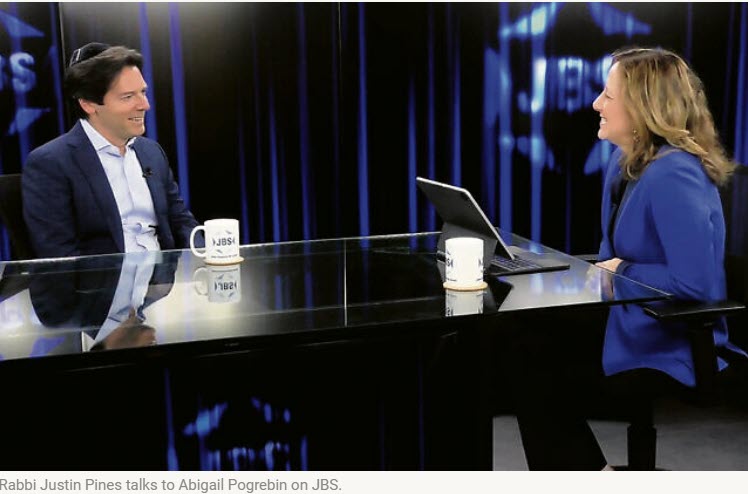Tuning in Rabbi Justin Pines
The Jewish Broadcast Service’s new leader discusses programming and purpose
By JOANNE PALMER
February 29, 2024

One of the best ways to tell that an organization isn’t just its founder’s brainchild, one determined person’s passion project, but an entity with an independent presence in the world is whether it can outlive that founder.
It’s a sad test, but a real one nonetheless.
The Jewish Broadcast Service has passed that test. It has survived the death of its creator, Rabbi Mark Golub, who lived in Connecticut but broadcast from Fort Lee, in offices and studios right off the George Washington Bridge, and now is led by Rabbi Justin Pines. Its offices have moved to Times Square, but Rabbi Pines grew up in Livingston and now lives in Englewood.
Jewish Broadcast Service’s values are manifest in its leaders. Rabbi Golub, who died in 2023, was a Reform rabbi with deep family and personal ties to the Orthodox, Conservative, and Reconstructionist worlds. Rabbi Pines is an Orthodox rabbi with smicha from Yeshivat Chovevei Torah who graduated from the Conservative Golda Och Academy in West Orange.
JBS values pluralism, inclusiveness, and openness to anyone who is interested in Jewish values, Jewish learning, and the Jewish community, Rabbi Pines said. The nonprofit airs programming 24/7, he continued. “It offers a pluralistic lens for people from all parts of the Jewish world, and beyond. It doesn’t represent any movement, and in my opinion it’s a way for people from all different backgrounds and locations to gain access to Jewish identity from wherever they are.”
Rabbi Golub created JBS in 2006 — when it was called Shalom TV — as a cable-dependent network. Because technology has expanded the number of platforms that can show any one program, JBS now provides content not only on cable — “we’re on almost every cable provider nationwide,” Rabbi Pines said — but also “on Direct TV and all the apps and YouTube and Apple TV and Roku. In any given month, we get over half a million viewers across the country.”
Rabbi Golub was an entrepreneur with a passion for Jewish education. It’s not surprising that he created JBS, which allowed him to use both of those characteristics. Rabbi Pines is at heart a Jewish educator, so it makes sense that he’d be drawn to the educational tool that is JBS.
He graduated from the University of Pennsylvania, where he majored in communications, and from Harvard Law School and worked at Paul, Weiss, Rifkind, Wharton & Garrison for a few years, and then in the Warner Bros. legal department. But when he realized that he was more drawn to education than law, he went to the Ramaz School on the Upper East Side, where he was the middle school’s director of character, and then to the Shalom Hartman Institute, which he left for JBS as the director of lay education. Along the way he’s studied at the Pardes Institute, been a Wexner fellow, and a senior fellow at Yitz and Blu Greenberg’s passion project, the JJ Greenberg Institute for the Advancement of Jewish Life. All together, this is the résumé of someone who not only is deeply immersed in Jewish education, but has the background in law, communications, and media that would help him teach large groups of people in a constantly changing media environment.
The network Rabbi Pines now oversees — he started his new job in February — provides insight “into the big ideas, the people, and the events that are shaping the Jewish people and the Jewish mission now,” he said. “We do that through a variety of programming, everything from scripted programs to interview-style programs. We have a show called ‘Defending Israel’ with David Harris” — he’s the retired longtime head of the American Jewish Committee — “that’s a deep dive into the situation in Israel, and at the ideas that have been coming out from there since October 7. We partner with the Institute for the Study of Global Antisemitism and Policy, and we have a weekly program with them that is an overview of what is happening with antisemitism.”
On a less grim note, “we have a program called ‘In the Spotlight’ with Abigail Pogrebin; it’s an interview program covering ideas and books. The last two interviews were with Dan Senor and Rabbi Sharon Brous.
“And we have a show that right now is called ‘The Justin Pines Show,’ where I focus on the Torah, the Jewish people, and both current and historic Jewish events, and I discuss those three topics to help connect to the Jewish people and the Jewish mission.”
JBS programming is a mix of home-grown shows and content from partners including, among others, the Temple Emanu-El Streicker Cultural Center — that’s the Emanu-El that stands grandly on Fifth Avenue in Manhattan — and 92NY, as Manhattan’s 92nd Street Y has renamed itself.
“Another core piece of our programming is daily news on what’s happening in Israel,” Rabbi Pines said. Most of JBS’s content is in English, but there is some Hebrew scripted programming from partners, he added.
“We air Shabbat services from Central Synagogue” — that’s the big, influential Reform shul in midtown Manhattan — “and the Hampton Synagogue” — the prominent Orthodox shul in Westhampton Beach. “Those services are pre-recorded,” he said. “We air words of Torah from Shlomo Riskin,” the American-Israeli Orthodox rabbi who founded Lincoln Square Synagogue on the Upper West Side before making aliyah and becoming the chief rabbi of Efrat, “and from Rabbi Ammiel Hirsch,” who leads the Stephen Wise Free Synagogue on the Upper West Side, which is Reform, “and Rabbi Elliot Cosgrove” of the Park Avenue Synagogue on the Upper East Side, which is Conservative.
“We are pluralistic, but not in an anything goes way, and not in a let’s-not-step-on-toes way. We bring curiosity to all the different areas and different people across the Jewish world, and we believe that viewers deserve to be exposed to the best of the Jewish people in all these different ways.
Much of the programming is new, but some is not.
“Some of our flagship programs are from Mark, who created a treasure trove of programming, and it’s still as relevant as ever,” Rabbi Pines said. “He was ahead of his time. He had a show called ‘L’Chayim,’ where he interviewed everyone from Jackie Mason to Rabbi Sacks to Shai Held to Donniel Hartman to Yehuda Kurtzer to Letty Cottin Pogrebin to Neshama Carlebach to Angela Buchdahl to Natan Sharanky.” He paused to breathe. “This list is not at all inclusive,” he continued. “It goes on and on and on. It is an endless list. He really was ahead of his time. He sat down and had these one-on-one, deep personal conversations. They are not boilerplate. Rabbi Sacks” — that’s Rabbi Lord Jonathan Sacks, the late chief rabbi of the United Kingdom — “talked about childhood and his parents. These conversations are as relevant as ever.”
The effect that October 7 has had on JBS is to make its leaders ever more aware of the dangers of antisemitism and the importance of Israel, and the network’s programming reflects that understanding. “We also are seeing a turn toward Judaism, the Jewish people, and Jewish practice from a lot of Jews,” Rabbi Pines said. “They are looking. They are searching. They are deeply troubled by what is happening in Israel and what is going on here.
“On a global scale, the tragedy of October 7 and the war, and the antisemitism coming from it that is not being hidden, has made people reevaluate their relationship with Jewish people, and with God. How do I fit into this people? What is the big picture here? What is the mission of the Jewish people? What is my relationship with the Divine?
“We will talk to leading thinkers about these questions and continue to provide in-depth programs about Israel, antisemitism, and the Jewish identity.”
Purim is coming up — it starts on the evening of March 23 — “and I’m a big believer that at the heart of the Jewish calendar is the idea that we come back to certain questions on an annual basis,” Rabbi Pines said. “Purim brings up the question of what it means to be living in the Diaspora. We revisit that idea every year. So I’m bringing on Dr. Erica Brown” — the writer who is Yeshiva University’s vice provost for values and leadership — “to discuss diaspora and Amalek, and Haman. What does it mean when someone is trying to destroy Jewish bodies? Haman represents genocide. What does that mean?”
Dr. Mijal Bitton, a research fellow at the Hartman Institute and the rosh kehilla and co-founder of the Downtown Minyan in Manhattan, will discuss Amalek and antisemitism today.
“And another question is the hiddenness of God,” Rabbi Pines continued. “God’s name is not mentioned in the Book of Esther at all. So we have a question. What does it mean? That God is absent from the world we live in today? Does that mean that we need to find God when God is hidden? Is that a human responsibility?”
Rabbi David Aaron, whose website positions him as an “astute visionary, a prolific, lucid writer and a soulful, invigorating educator,” will join Rabbi Pines for that discussion.
“That gives a sense of what the discussion around the calendar can be like,” Rabbi Pines said.
So the programming on JBS is for a wide range of interests, levels of knowledge, and moods. “It’s a diverse set of programs for a diverse and wide audience who are interested in Jewish ideas and Jewish people.
“We also have movies most Saturday nights,” Rabbi Pines said. “We have programs like ‘Srugim,’ we have some programs about sports, we partner with Yeshiva University to show their men’s basketball games.”
Truly there’s something for everyone.

